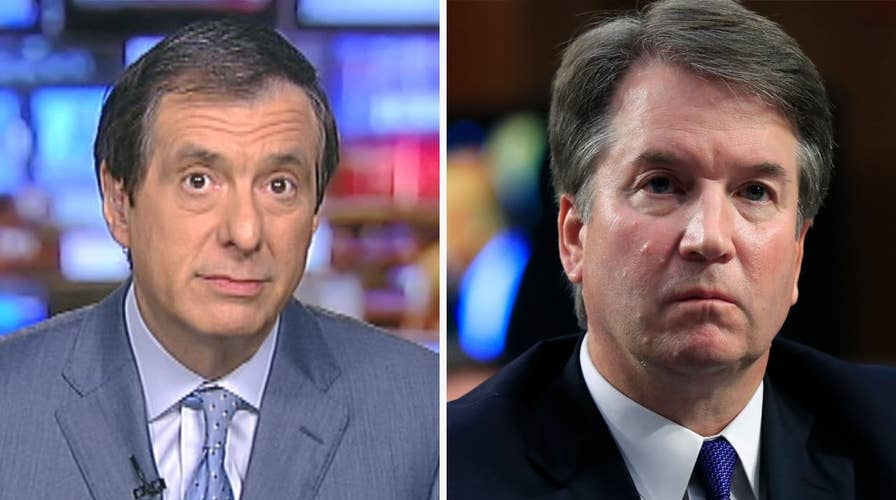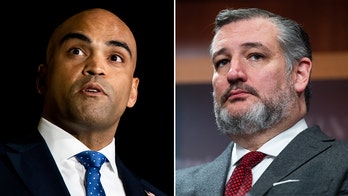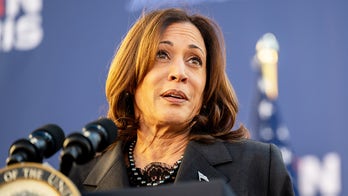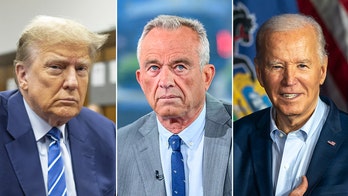Kurtz: Why the Press now seems in the anti-Kavanaugh camp
'MediaBuzz' host Howard Kurtz weighs in on the news media piling on on the anti-Kavanaugh claims.
One story involves Brett Kavanaugh throwing ice at someone in college.
Another involves him writing a letter to his high school buddies about a beach week trip.
Still more focus on the cryptic references in his Georgetown Prep yearbook.
Really?
The constant barrage of stories about long-ago misbehavior by the Supreme Court nominee is creating an unmistakable impression that the mainstream media are part of the Kavanaugh opposition.
The sheer tonnage of critical pieces seems to suggest that any minor misbehavior as a student, even uncorroborated accusations, are grounds for disqualification from high office.
I'm not talking here about the serious charge of sexual assault leveled by Christine Blasey Ford. Given the lack of corroboration, the country seems deeply split on that, mostly along ideological lines, and the quickie FBI probe likely offers no resolution since agents haven't interviewed Ford or Kavanaugh.
So the media hunters are going after smaller game.
I'm struck on several levels by this New York Times piece on Kavanaugh's involvement in a 1985 bar fight.
Kavanaugh was "accused of throwing ice on another patron," the paper says. Imagine.
Things turned serious, according to the police report, when a Kavanaugh buddy threw a glass at the man, who the group had mistaken for a rock singer, causing bleeding from the ear and a trip to the hospital. The Times found an eyewitness who confirmed the altercation.
A bar fight is not exactly a huge scandal. But what made the story seem especially partisan was the co-byline of Emily Bazelon, a well-known liberal voice and Yale lecturer who writes op-eds for the paper and pieces for the Times Magazine. In July, Bazelon tweeted that "I strongly disassociate myself" from the "praise for Judge Kavanuagh because he’s a 5th vote for a hard-right turn on voting rights and so much more that will harm the democratic process & prevent a more equal society."
The Times at first defended Bazelon's involvement to the Daily Caller, but the paper eventually realized its mistake. A spokeswoman said that Bazelon "is not a newsroom reporter. Her role in this story was to help colleagues in the newsroom gather public documents in New Haven, where Emily is based. In retrospect, editors should have used a newsroom reporter for that assignment."
Another Times story seems even thinner gruel. Kavanaugh was writing to his high school buddies in 1983 about a planned beach week in 1983.
The letter was mainly about how they should bring their own bedding and other details, but in a postscript he said that whoever arrived first at the condo should "warn the neighbors that we're loud, obnoxious drunks with prolific pukers among us. Advise them to go about 30 miles ..."
So what might be nothing more than a joking reference becomes a story.
The underlying justification here is that if Kavanaugh can be found to have minimized his drinking, it could chip away at his credibility. But these two stories have nothing to do with sexual assault. Do we want drinking, or drunken scuffles, as a high school or college student decades earlier to be a disqualification for high office?
And then there's NBC and Julie Swetnick, the third Kavanaugh accuser. The media were absolutely played on this one by her lawyer, Michael Avenatti, who released her statement without corroboration and without making her initially available. And yet almost all news outlets ran with her unsubstantiated account insinuating that Kavanaugh had at least been complicit in gang rape at a series of parties.
But Swetnick backed off key points in her NBC sitdown. After claiming that Kavanaugh had spiked the punch at these parties, she said she only saw him near the punch. After floating the gang-rape scenario, she said only that he was pawing and was handsy with women. And of the four sources she offered of people at the parties, one is dead, one said he didn’t know Swetnick, and two did not respond.
Her story is collapsing. So was this worthy of airtime from NBC, which said it couldn't corroborate the allegations?
President Trump didn't help matters by mocking Ford and her allegations at a Mississippi rally, which has brought him a torrent of well-deserved criticism from the press and from some Republicans. But the media increasingly appear to be trying to stop Kavanaugh’s confirmation rather than reporting fairly on the political battle.
Footnote: As a followup to my column on journalists and other women breaking their silence and sharing painful stories of past sexual assault, two more television personalities have come forward.
Connie Chung, in The Washington Post, recounts a sexual assault by a doctor when she was in college.
And Kirsten Powers, the former Fox commentator now at CNN, describes in USA Today a sexual assault by a friend when she was 15.





